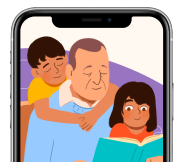Empathy Definition
Emotion researchers generally define empathy as the ability to sense other people’s emotions, coupled with the ability to imagine what someone else might be thinking or feeling.
The three most common types of empathy are:
- Cognitive: Cognitive empathy means that you can understand another person's feelings or experience. It is also referred to as perspective-taking or putting yourself in someone else's shoes
- Emotional: Emotional empathy is focused on mirroring another person’s emotional state. Actually feeling what they feel. So for example if a person is crying, you may also start to feel sad and cry.
- Compassion: we not only understand a person’s predicament and feel with them, but are spontaneously moved to help and support, if needed. The tricky balance here is not offering help where it’s not wanted, avoiding passing judgment, and ensuring we can manage our own feelings and emotions before helping others.
Source: “When can empathy move us to action?”, by Daniel Goleman.
What are the core components of empathy?
Brené Brown Video on Empathy
- The willingness to step into the experience and feelings of another human being.
- Feeling what others feel
- Seeing from someone else’s perspective or point of view
- Acknowledging the vulnerability and courage to share
- Not passing judgment
- Offering help and support, if the other person wants it (see #5)
Why is Empathy Important?
- Personal relationships: A critical skill in close relationships with friends or significant others is being able to connect, have shared experiences, and be able to see their point of view without judgment. That shoulder to cry on, support when you’re down, and power to be seen is the core of an intimate relationship.
-
Parenting: As children get older, grow, and face more complex emotional challenges, empathy from a parent is critical. Opening the door to open and honest conversations start with being able to connect emotionally. Without this, a child can feel alone and turn to less reliable sources of support.
“When parents offer their children empathy and help them to cope with negative feelings like anger, sadness, and fear, parents build bridges of loyalty and affection.”
― John M. Gottman, Raising An Emotionally Intelligent Child -
In the Workplace: Empathy from business leaders can improve team morale, increase loyalty, and reduce work anxiety. In a post-pandemic world where many workplaces are remote, the ability to connect with folks across the country is critical.
“People will try to convince you that you should keep empathy out of your career. Don’t accept this false premise.” - Tim Cook, CEO of Apple. - Benefits in Healthcare settings: A study published in the British Journal of General Practice found that greater empathy from doctors, helped improve patient outcomes. As the doctor gained trust with a patient, they were more willing to share details and adhere to the treatment plan which improved the efficacy of the course of action and health outcomes.
Can Empathy be Learned?
Yes! Without a doubt, empathy can be learned and improved upon. Effective ways to improve empathy include:
- Curiosity: Talk to new people, learn their story, and learn how other’s live.
- Travel: visit areas outside of where you live. If you live in the city, visit the country, travel to another state or country. Spend time learning about their culture, beliefs, and history.
- Volunteer: work with people outside of your normal social circle, work towards a common cause that helps others.
- Check yourself: Admit bias, listen more than you talk, be open to other points of view.
- Practice: Read through examples of what empathy looks like in practice whether with a significant other, coworker or child. Practice, practice, practice.
What Does Empathy Look Like?
Let’s start with the basics -
- Listen without interrupting
- Be open to feeling what the other person is feeling
- Imagine yourself in the other person’s shoes
- Remain vulnerable, share from your own experience
- Avoid judgment
- Don’t jump to a solution
Ways to start an empathetic conversation-
- I’m sorry you are going through this.
- I hate that this happened to you.
- I don’t know what to say.
- My heart hurts for you.
- I’m really glad that you shared this with me.
- How are you feeling about it now?
Source: Empathetic Statements
Books about Empathy
Videos about Empathy
Watch our curated playlist of youtube videos discussing empathy from experts like Brené Brown, John Gottman, Simon Sinek, Paul Ekman, and even a comedic break from Saturday Night Live.
Podcast about Empathy
Empathy FAQs
-
Empathy vs. sympathy?
Empathy is feeling what the other person feels, sympathy is feeling sorry for them. The latter often creates distance, while the first creates connection. -
What are synonyms for Empathy?
Understanding, feeling, compassion. See more empathy synonyms here. -
What are antonyms for Empathy?
Apathy, discord, distance. See more empathy antonyms here. -
Compassion vs. empathy
Compassion is a response to empathy. When you feel what someone else is feeling, then act on it. -
What is an empathy map?
Dave Gray created the tool to help people develop empathy for customers and within organizations. -
What if I don’t have empathy?
The majority of people can feel a form of empathy even if it’s low or undeveloped. Through practice, tools, and focused effort, most folks can improve their empathy. In some cases, a trained therapist may be the best course of action to create a plan and begin to build the skills necessary to improve empathy.





